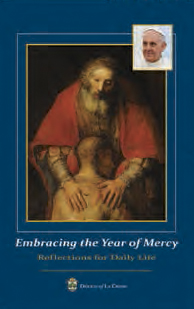 On May 1, 2011, we celebrated the Feast of Divine Mercy and Pope John Paul II’s beatification. For weeks, I have been pondering the significance of this feast for the whole Church and the fact that Blessed John Paul II was beatified on the feast he established! God is underlining the significance of this feast for us, proclaiming throughout the world that we need the mercy of God and that it will be given to all who ask.
On May 1, 2011, we celebrated the Feast of Divine Mercy and Pope John Paul II’s beatification. For weeks, I have been pondering the significance of this feast for the whole Church and the fact that Blessed John Paul II was beatified on the feast he established! God is underlining the significance of this feast for us, proclaiming throughout the world that we need the mercy of God and that it will be given to all who ask.
The mercy of God is lavish, overwhelming and infinite. No matter what we have done wrong, God will forgive those who come to him in repentance. Not only does God forgive wholeheartedly, but, in his mercy, he forgets! He does not hold it over us. “It is I, I, who wipe out, for my own sake, your offenses; your sins I remember no more.” (Is 43:25)
Do we really understand what God did for us in sending Christ? Adam and Eve’s disobedience against God was an offense that we, on our own, could not make up for. It was an offense against an infinite God — and we are finite. But God, in his great mercy, sent his Son to suffer and die on our behalf — to atone for our sin. The Father accepted Christ’s sacrifice and, in turn, made you and me his sons and daughters. We are now heirs to the kingdom — heirs of eternal life. That, brothers and sisters, is mercy.
But because we have free will, we have the “power” to choose to accept or reject God’s mercy. Sometimes when we sin, we may think: “I have sinned grievously against God and there is no hope for me. God couldn’t forgive this sin: (Fill in the blank from your own life).”
But, brothers and sisters, consider this passage from the Book of Lamentations: “His mercies never come to an end; they are new every morning.” God’s promises are always true. If we express our sorrow, go to confession, and ask for forgiveness, it will be given! How deep and rich and wide is the mercy of God. St. Faustina, to whom the Lord revealed the depths of his mercy, heard these words from Christ: “I desire that the whole world know my infinite mercy. I desire to grant unimaginable graces to those souls who trust in my mercy.” (Diary of St. Maria Faustina, 687)
One of the major obstacles to receiving the mercy of God is our own pride. Even if we regularly participate in the Mass and the sacraments, we may be obeying the teaching of the Church in order to earn our way into God’s favor. We think if we just follow the rules, that’s enough. But if that is the extent of our motivation, we can end up sterile and empty — like the Pharisees of Jesus’ time.
It is the work of the Holy Spirit within us to fill us with a hunger and thirst for Jesus. As we do, we come to see more and more that our sins and failings keep tripping us up; that, without help from God, great help, we will continue to fall into sin and turn away from him. It is Jesus, by his death and resurrection, who saved us and who goes on saving us every moment, if we put all our trust in him and not in ourselves. We cannot make ourselves good or holy. But, if we turn to him for help against sin day by day, God will be faithful to us!
by Sister Ann Shields is a renowned author and a member of the Servants of God’s Love.
Spiritual exercise
When going to confession, don’t just recite your failures. Take time beforehand to ask God for mercy, to declare to him that you want to face your sin squarely and admit your inability to make a permanent change without his saving grace. He will give that grace if you humbly ask for it. Gradually, the heavy burden of trying to save yourself will be replaced by a growing confidence that God will aid you in turning away from sin and supply you with grace, confidence, and hope. God wants a relationship with you. He is your Father, your Savior, the Source of all love. Abandon yourself to him. Put all your trust in him! You will not be disappointed.
 SPIRITUAL READING
SPIRITUAL READING
At the heart of this booklet are 31 brief daily reflections, including:
- Reflections on each of the spiritual and corporal works of mercy with short illustrative stories
- Passages from Sacred Scripture
- Questions for reflection
- Suggestions for personal application
- Prayers and devotions centeredon mercy
- A “Daily Examen”
— How am I responding to God’s grace and the call to mercy?
For more resources for The Year of Mercy through the Diocese of La Crosse, please visit www.diolc.org/mercy
